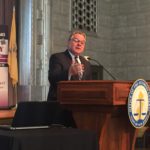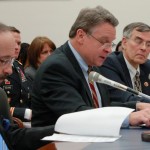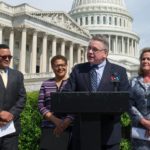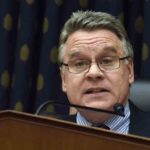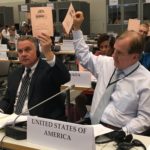Smith calls on NJ Leaders to combat human trafficking, return civility to politics, in keynote address
In his keynote address to leaders of New Jersey’s business community and government at the New Jersey Chamber of Commerce’s annual Congressional Diner in Washington, Congressman Chris Smith acknowledged his audience’s efforts in job creation and in combating the coronavirus outbreak before challenging the leaders to step up their efforts to combat human trafficking and to increase the civility of the political discourse in New Jersey and nationwide.
Smith’s remarks as prepared for delivery are below :
A special thank you to Tom Bracken and the entire NJ Chamber leadership for effectively promoting economic growth, job creation and job retention throughout our state.
The challenge ahead is to forge a sustainable pro-growth agenda including lower taxes to make New Jersey more affordable for all and so that businesses can hire, expand and thrive.
The record number of jobs that you have created tangibly helps ever increasing numbers of people find a decent place to live, put food on the table, access high quality health care, plan for a more secure retirement and hopefully spend a little time on the Jersey shore.
One month ago, after successful negotiations with Mexico and Canada, President Trump signed the United States-Mexico-Canada Agreement Implementation Act (USMCA) to replace the egregiously flawed NAFTA. Who would have thought that the USMCA was even possible and would be supported by both the Chamber of Commerce and the AFL-CIO and pass 385 to 41 in the House and 89 to 10 in the Senate?
Good things happen when we work together.
Today, we face an unprecedented number of vexing problems at home and abroad—now it’s the coronavirus or COVID19.
According to the World Health Organization (WHO) as of today there are more than 81,000 people infected and today for the first time there have been more new cases reported from countries outside of China than from China.
On Tuesday, the CDC said they are preparing for a potential pandemic.
HHS Secretary Azar asked Congress for and will promptly get an emergency multi-billion dollar appropriation to expand coronavirus surveillance work, to support public health preparedness, development of therapeutics and vaccines and funds for the purchase of personal protective equipment for the Strategic National Stockpile.
Special thanks to New Jersey-based Janssen Research & Development—part of Johnson and Johnson—for already partnering with the Biomedical Advanced Research and Development Authority (BARDA), in the race to develop a coronavirus vaccine and to develop coronavirus therapeutics.
(Janssen’s Ebola vaccine now in use and saving lives in the Democratic Republic of Congo and Rwanda has helped stop the spread of that horrifying disease and enabled health workers to attend to patients. Merck has developed an Ebola vaccine as well.)
Thank you for this—and all the amazing drugs and therapeutics and vaccines that save lives and give us a well-founded hope that other diseases like cancer will be cured someday.
Allow me a brief word on human trafficking and combating it as part of your business model.
Human trafficking is a barbaric human rights abuse that thrives on greed, secrecy, a perverted sense of entitlement to exploit the vulnerable and an unimaginable disregard for the victims.
According to the ILO, at least 25 million people are trafficked globally and the national hotline run by Polaris estimates hundreds of thousands of victims in the United States.
At a White House summit on January 31st, the President marked twenty years since enactment into law of historic legislation that I authored—the Trafficking Victims Protection Act (TVPA) of 2000—which created a new whole-of-government domestic and international strategy and established numerous new programs to protect victims, prosecute traffickers and to the extent possible prevent it in the first place—the three Ps.
When I first introduced it, the legislation was met with a wall of skepticism and even opposition—dismissed by many as a solution in search of a problem. For most people at that time, the term trafficking applied almost exclusively to drugs and weapons, not human beings.
Reports of vulnerable persons—especially women and children—being reduced to commodities for sale were often met with surprise, incredulity or indifference.
Thankfully, that has changed—big time.
In a speech to NJ county prosecutors last November in Atlantic City hosted by Mercer County prosecutor Angelo Onofri, I urged them to continue prioritizing prosecutions of those who enslave and exploit. I also noted the increasing number of boys who are joining girls and women as victims.
A 2016 study commissioned by the U.S. Department of Justice which found that up to 36 percent of the children forced into the U.S. sex industry were male. The study included interviews with youth and official records data collection in six sites including Atlantic City.
Law enforcement is the front line and police at every level have put their lives at risk every day to apprehend the perpetrators of these heinous crimes and to rescue victims.
A few hours ago, I met with Paul Nunziato, President of the Port Authority PBA and his delegation. What they have done since the 1970s—so they were way ahead of the curve— to combat predatory activities in transportation hubs like bus stations is unmatched.
Detective Jack Collins—a NAPO Top Cop award winner—told the story of young 12-year-old girls being trafficked—then rescued by him and others. Training coupled with empathy for the victim—makes the big difference. All 1,800 officers have been given human trafficking training.
Today, as you know, the private sector—including and especially industry groups and individual businesses—have joined the fight and you are having an enormous impact.
If you haven’t already, I respectfully ask you to make combatting human trafficking part of your business model.
The American Hotel and Lodging Association has launched the No Room for Trafficking Initiative to “ensure hotel employees are continuously developing a better understanding of ways to identify traffickers and potential victims in hotels.” Marriott has trained 650,000 employees globally. Hilton, Holiday Inn, Motel 6, Wyndham, Best Western, and Red Lion have trained thousands more.
The airline industry has launched situational awareness training as well to ensure that their employees recognize and quickly report a potential trafficking incident before the exploitation occurs.
Airline Ambassadors International has completed 117 airport trainings in the U.S. and 16 other countries—including Newark Liberty International. They have trained thousands of flight crews to be observant and have rescued many. The signs include the victim being frightened, ashamed or nervous: not in control of travel documents; under control of a companion; unsure of the destination.
- Delta Airlines is out front having the most robust training for 86,000 employees and they are even hiring human trafficking survivors.
- United Airlines signed a partnership this year with DHS and vastly strengthened their training for 76,000 employees and is the only airline to have signed the United Nations Global Compact.
- American Airlines has trained 70,000 front line employees, and also partnered with DHS.
Truckers Against Trafficking have written the book on how to discern and disrupt human trafficking networks through training and referrals to law enforcement. More than 845,000 personnel have been trained!
In 2014, a landmark study published in the Health Policy and Law Review of Loyola University Chicago School of Law that found that 87.8% of all trafficking victims interviewed had utilized some healthcare including 63% who had visited a hospital/ER.
The study found that most victims suffered from multiple STDs. More than 70% reported physical injuries—most commonly to the head and face. Cardiovascular and respiratory difficulties were found in over 68% of the victims and gastrointestinal problems in 62%. Mental health problems from the exploitation was especially severe—over 90%.
One survivor, Amanda, put it this way: “The mental health problems are the worst and most long lasting. I was diagnosed with chronic depression, have anxiety, post-traumatic stress syndrome, nightmares, flashbacks, disorientation. I’ve been suicidal at times. I don’t think anyone is out on the street without having these lasting effects.”
Trafficking victims are especially vulnerable to substance abuse as the pimps aggressively use drug addiction to facilitate dependency and compliance.
Health care professionals need to be especially vigilant to this reality.
Today, Hackensack Meridian Health and RWJ Barnabas Health are educating and empowering their healthcare professionals to recognize and—with the referral to law enforcement—liberate trafficked patients.
Everyone in healthcare—and in every profession—should be prepared to assist the vulnerable victims of human trafficking.
Finally, I believe it’s time for a new civility in politics.
I believe in principled bipartisanship as a means to that end. Working across the aisle for important causes and goals more often than not yields positive results for our constituents, state and nation.
In both Washington and Trenton, partisanship at times has a place as well, as long as it is tenaciously respectful and always takes the high road.
Perhaps as in no previous time, we live in the age of the perpetual political campaign where truth and the common good too often take a back seat to unchecked animosity and downright hatred. Enabled by hyperbole, distortion, surface appeal argument and the 24/7 cable news cycle, the public is increasingly ill served and resolving tough issues with good faith compromise has become more elusive than ever.
While disagreement is inevitable, when we disagree and have fundamental differences, I believe it is our duty to strive to advance our point of view with the utmost civility and respect.




